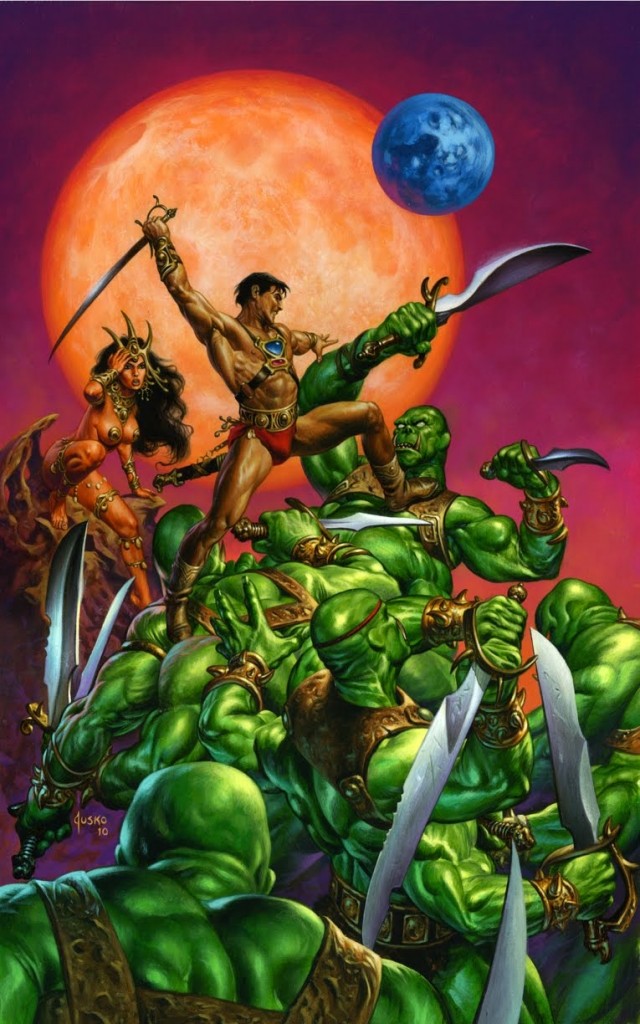Armor on Mars
Part of an ongoing conversation and love-fest of all things Barsoomian.
Sean M. Brooks writes a question that often returns to puzzle readers of scientifiction and scientific romances. Why is it, that, the conditions that obtain on Barsoom…
Why aren’t these warriors wearing ARMOR and carrying at least bucklers when they fight practically all the time using only swords? … Wearing armor would give these warriors some protection from the blows of their enemies. I can easily imagine how John Carter, coming from a heavier gravity world like Earth, would find armor on Barsoom especially easy to wear. So, why don’t they? Are metals like iron and copper too rare and costly for most warriors? Even if that was the case, I would think at least jeddaks (emperors) could afford armor for themselves and a few picked soldiers.
Many scholars of Barsoomania have pondered this question with philosophical diligence.

It is not explicitly said in the books, but there are a number of reasons that might be suggested by the background:
First and foremost, the Martians have guns that shoot explosive atomic bullets. Any cataphract or knight in heavy armor that approached with a shield-bearer before him would have simply been shot.
Second, the Martians ride without stirrups, saddle, or bridle. Before the days of the stirrup, armor was the exclusive gear of the infantry, of which we have no evidence any regular infantry exists anywhere on Barsoom.
Third, the weight of armor, even under the slight Martian gravity, may have been prohibitive for airships buoyed aloft by the radium-powered eighth martian ray. The dying planet would also place a low value on human life, and a high value on mobility, either by airship or many-legged steed, to go from the ever-fewer wells, canals, and oases.
Four, in the scene where John Carter fights a swordsman named Zad, he is stabbed through, fortunately in a spot where neither heart nor lungs are pierced. Carter reports:
Bleeding and weak I reached my women, who, accustomed to such happenings, dressed my wounds, applying the wonderful healing and remedial agents which make only the most instantaneous of death blows fatal. Give a Martian woman a chance and death must take a back seat. They soon had me patched up so that, except for weakness from loss of blood and a little soreness around the wound, I suffered no great distress from this thrust which, under earthly treatment, undoubtedly would have put me flat on my back for days.
This implies that the Martian skill at medicine is so great, the the number of times a man’s life is saved by armor may be less than it would be on Earth by a noticeable degree.
Finally and most importantly, it is the conceit of the author that the Martians, red and green both, are so honor-bound that they will not raise a pistol against a foeman armed only with sword. If a similar unearthly nicety of chivalry obtained in the matter of armor, no one would wish to fight an unarmored man without first removing his mail.
Add to this that the planet is dying, which means metal may be rare and expensive, contracting its use to ever fewer warriors. Among the Green Men, where all property is owned in common, the women (who manufacture the arms) may be unwilling to spend the resources on one warrior rather than using the same mass of metal to give swords to a dozen.
But even among the Red Men, a similar influence may obtain. Over the eons as the planet dies, and metal gets rarer, it may become cumbersome for the ever-fewer rich warriors to remove their mail before every combat with any poorer warrior, and the number of duels with warriors similarly equipped too rare to bother with. A man in armor would soon be seen (by Martian standards) as a coward.
In any city, the poor soldiers would rise up against the rich, once the rich are thought to be craven. To forestall such a revolt, the bold warlords of Mars might well have made a great show of going into battle without helm or armor, and this practice over eons was adopted and ingrained until it was unquestioned.
And the cheapness of human life, and the practice of delivering all goods of a slain main to his slayer, might make a suit of armor something of an attractive nuisance, particularly if it must be doffed before every duel against a man not so similarly armed and protected.

